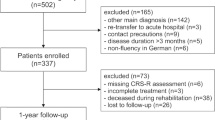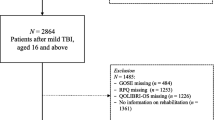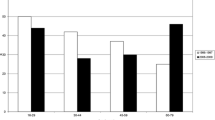Abstract
Purpose:
To review the quality management of functional neurorehabilitation in patients after craniocerebral trauma with an emphasis on factors that may explain variability of early and late outcomes after 1 year and how this might be influenced to improve health-related quality of life after traumatic brain injury (TBI).
Methods:
First ever prospective controlled, population- based, multicenter study on epidemiology of acute craniocerebral injuries (CCI) in Germany and analysis of acute medical care and functional rehabilitation with early and 1-year outcome. Catchment areas Hanover and Muenster (sum of inhabitants 2.114 million). The definition of acute CCI was according to the ICD-10: S-02, S-04, S-06, S-07, S-09 in combination with dizziness or vomiting, retrograde or anterograde amnesia, impaired consciousness, skull fracture, and/or focal neurologic impairment.
Results:
6,783 CCI patients (58% male) were admitted for emergency hospital treatment. 28% patients were < 1 to 15 years, 18% > 65 years of age. Completed questionnaires of 63.5% of the patients were analyzed. 1-year follow-up of two thirds of acute CCI. Incidence was 321/100,000. Initial CCI severity (Glasgow Coma Scale [GCS]) of 55% of patients showed 90.9% mild, 3.9% moderate, and 5.2% severe TBI. 5,221 patients (77%) were hospitalized, 1.4% of them died. Follow-up of 63.5%. Only 258 patients (3.8%) received neurologic-neurosurgical rehabilitation (73% male), 68% within 1 month after injury, 5% were < 16 years, 25% > 65 years of age. Early rehabilitation of 100 patients (39%), one fifth referred within first week. Outcome end of early rehabilitation phase “B”: Glasgow Outcome Scale (GOS) 1 = 4%; GOS 2 = 2.7%, GOS 3 = 37.3%, GOS 4 = 26.7%, GOS 5 = 29.3%, and end of rehabilitation “B–E”: GOS 1 = 1.2%, GOS 2 = 1.7%, GOS 3 = 21.8%, GOS 4 = 36.2%, and GOS 5 = 39.1%.
Conclusion:
Data on the epidemiology and quality management of early functional rehabilitation met the criteria set in 1992. Management of frequent multiple organ lesions and complications (57%) without referring the patient to another hospital and early functional outcome confirm the author’s concept of neurosurgical early rehabilitation.
Similar content being viewed by others
Author information
Authors and Affiliations
Corresponding author
Additional information
in cooperation with the TBI Study Council*
* Advisory board: W.J. Bock, Prof. em. Dr. med., former Director of the Neurosurgical University Hospital, Duesseldorf; W. Gobiet, Dr. med., former Head of the Neurologic Clinic, Hessisch Oldendorf; U. Lehmann, PD Dr. med., Senior Registrar at the Department of Accident, Hand, and Restorative Surgery of the Saarland University, Homburg/Saar; K. Mayer, Prof. em. Dr. med., Industrial Cooperative Compensation Fund Accident Clinic, Tuebingen; E. Rickels, Prof. Dr. med., Head of the Department of Neurosurgery, Clinic of the Medical University, Ulm, former Senior Registrar at the Neurosurgical Clinic of the Medical University, Hanover (MHH); Dr. B. Sens, Head of the Center for Quality Management in Healthcare, Physicians’ Chamber of Lower Saxony, Hanover; H.D. Wassmann, Prof. Dr., Director of the Neurosurgical University Clinic UKM, Muenster; P. Wenzlaff, Medical Statistics, Center for Quality Management in Healthcare, Physicians’ Chamber of Lower Saxony, Hanover; R. Wiechers, former Managing Director of the Curatorium CNS for Accident Victims with Injuries of the Central Nervous System and of the Hannelore Kohl Foundation, Bonn; K.R.H. von Wild, Dr. med. Professor of Neurosurgery, Medical Faculty of the Westphalian Wilhelms University Muenster, Former Head of the Neurosurgical Department and the Unit for Posttraumatic Early Rehabilitation, Clemenshospital, Teaching Hospital, Muenster, Germany.
Rights and permissions
About this article
Cite this article
von Wild, K.R.H. Neurorehabilitation Following Craniocerebral Trauma. Eur J Trauma 31, 344–358 (2005). https://doi.org/10.1007/s00068-005-2059-z
Received:
Accepted:
Issue Date:
DOI: https://doi.org/10.1007/s00068-005-2059-z




